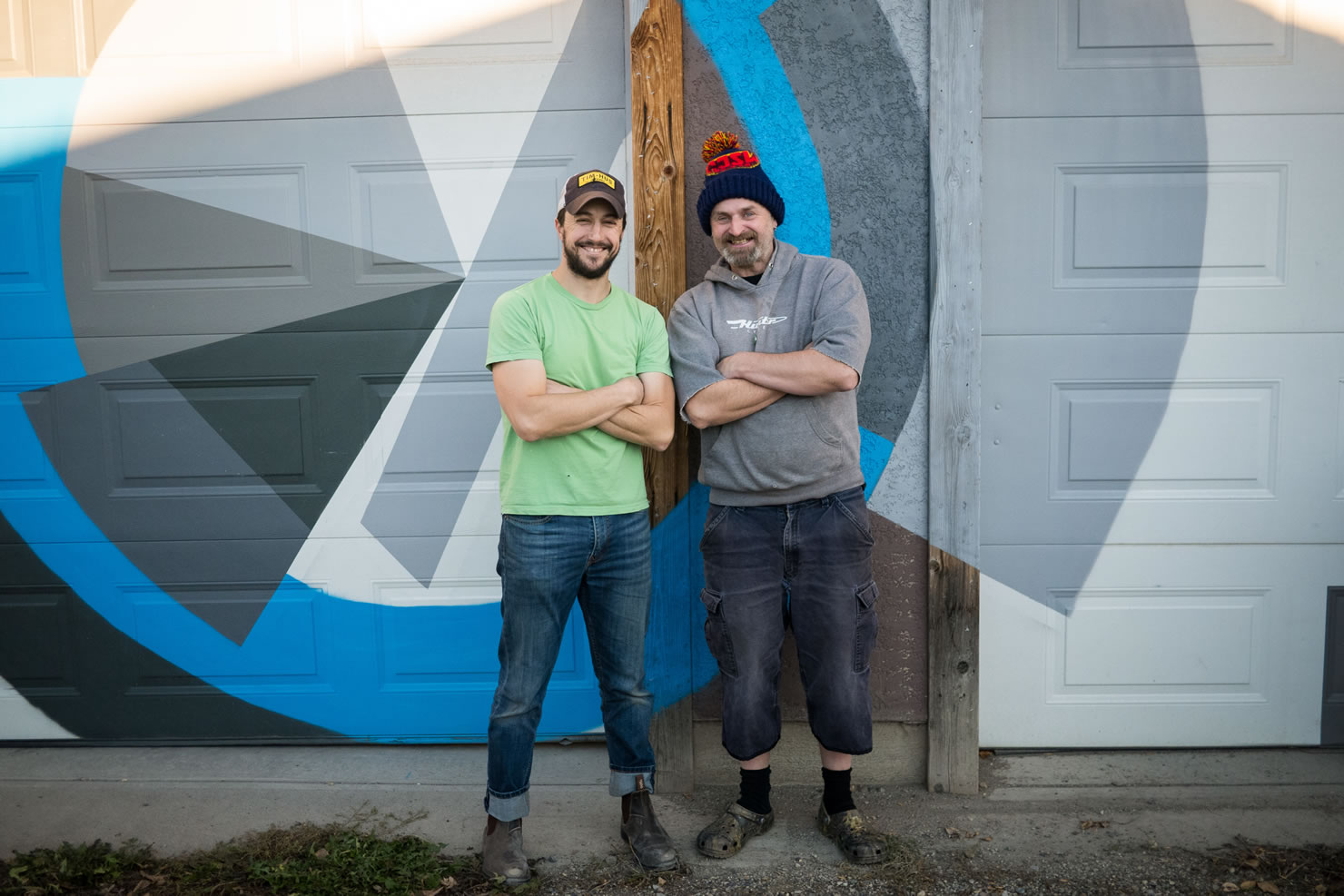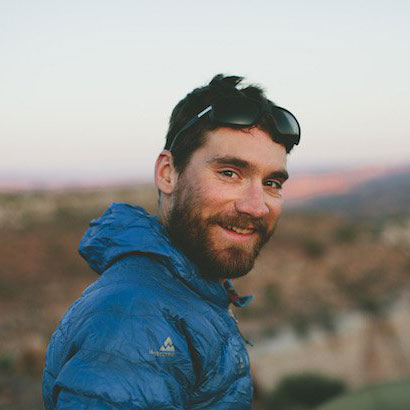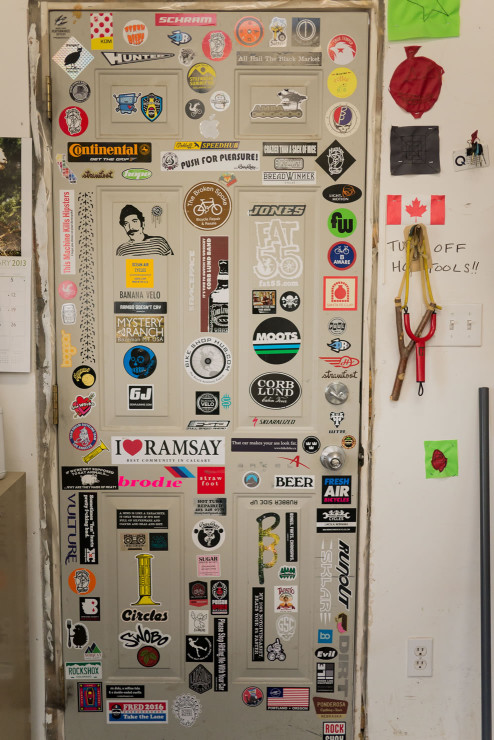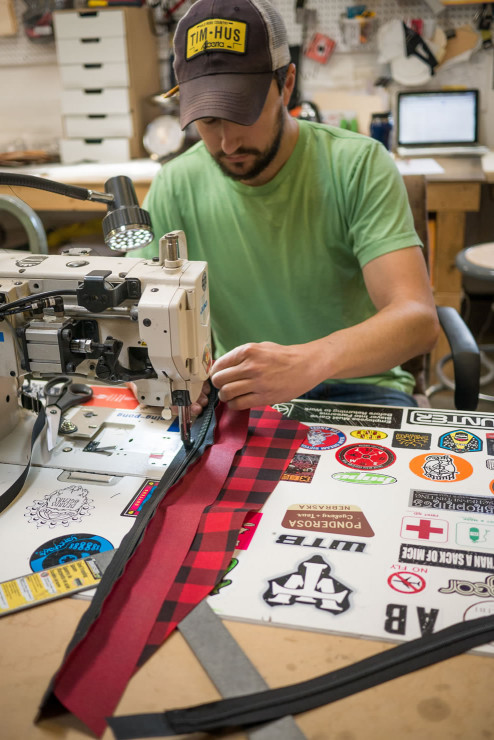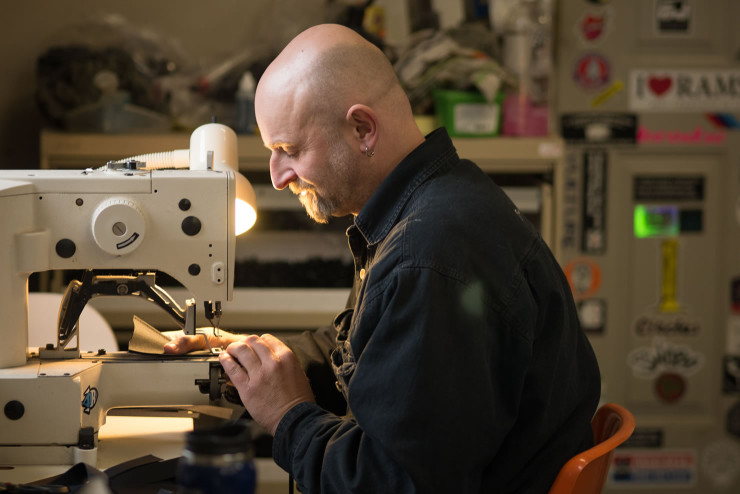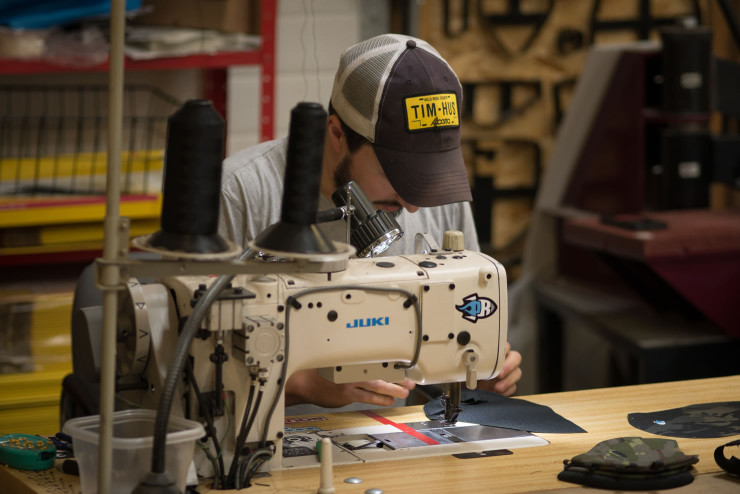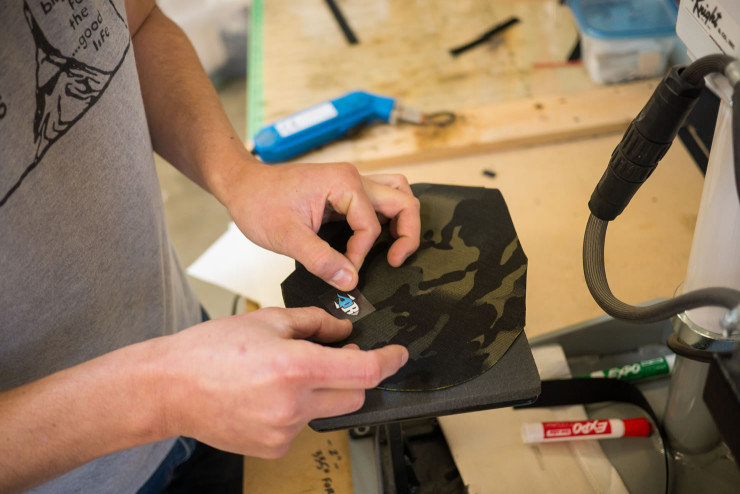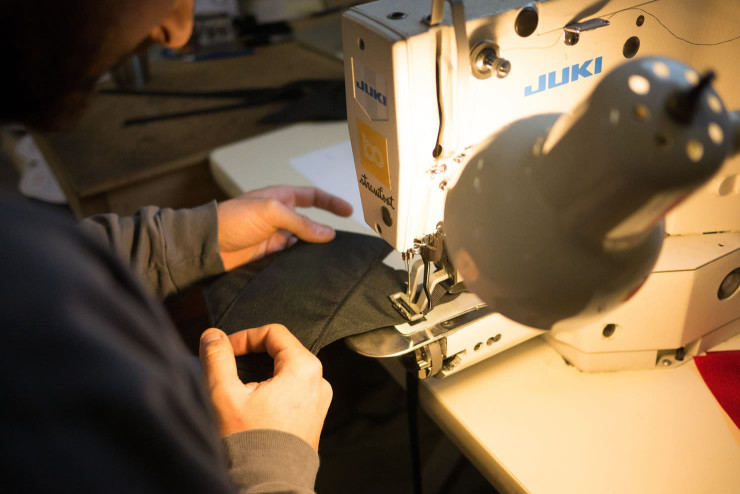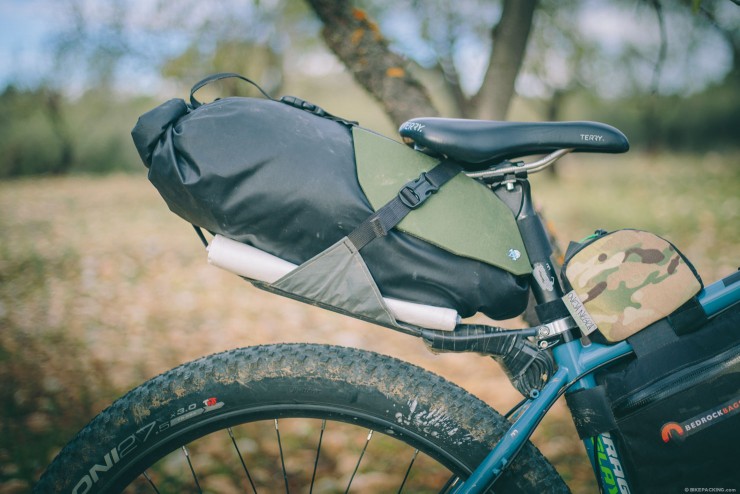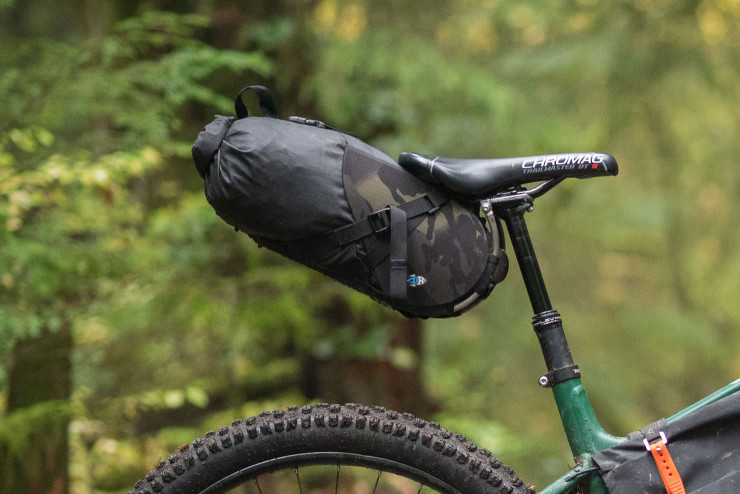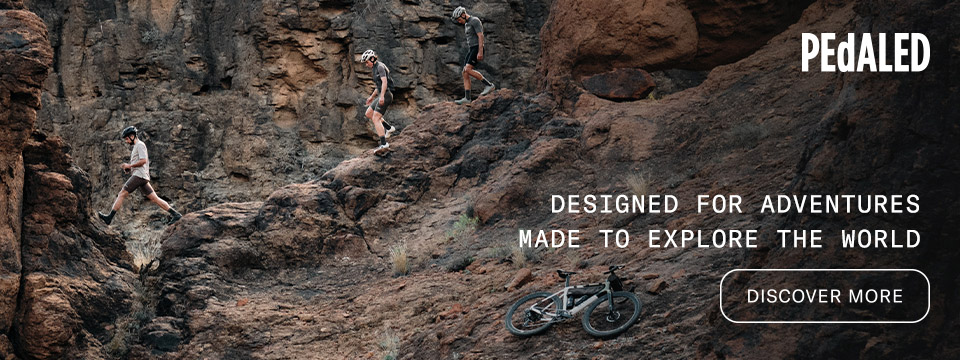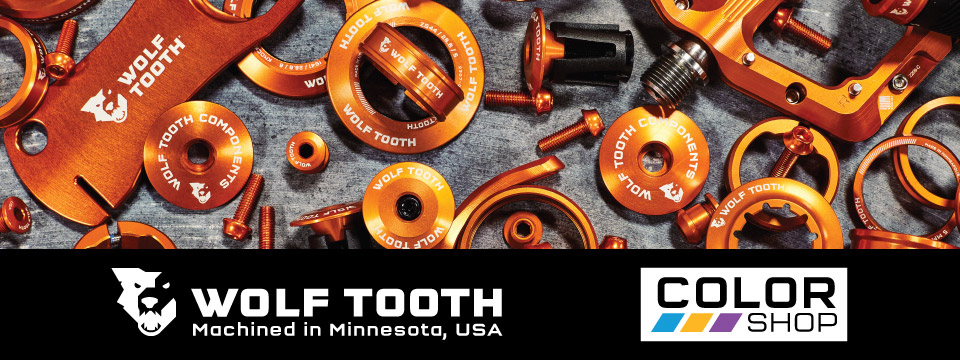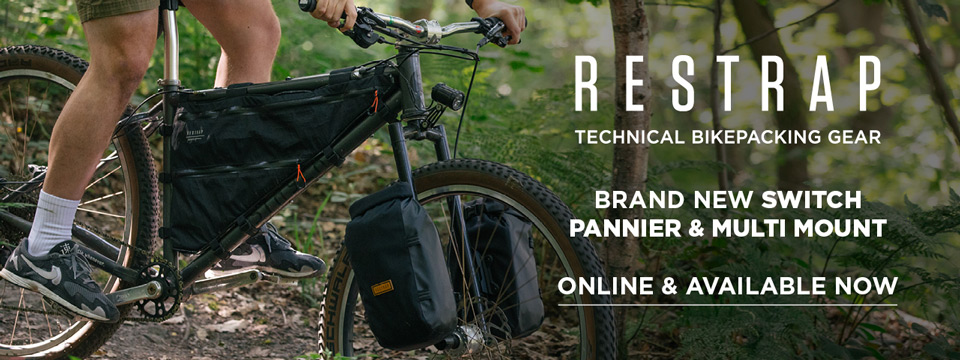Porcelain Rocket: Then, Now, and Next.
Scott likes to say that the name ‘Porcelain Rocket’ references the exploratory efforts of civilizations-past, in their search for the coveted porcelain material, and to humanity’s urge to venture into the great unknown, into outer space. But the name came first from his past life as a potter, and his life-long passion for riding bicycles at top speed. It started as his own nickname…
PUBLISHED Nov 3, 2016
Porcelain Rocket began seven years ago, in Banff, Alberta. Scott Felter, originally from New Orleans, met his wife while visiting Banff on a pottery residency and never left. He started making bags to carry his things on day rides, and after riding the Great Divide Mountain Bike Route, he was inspired to make more bags on the side and sell them. Later, when they moved to Victoria, BC, Scott built bikepacking bags in their basement, and as demand steadily increased, it became a full-time job. Of course, back then, the sport of bikepacking was just taking off, and only Revelate had been building custom bikepacking bags. A lot has changed since then.
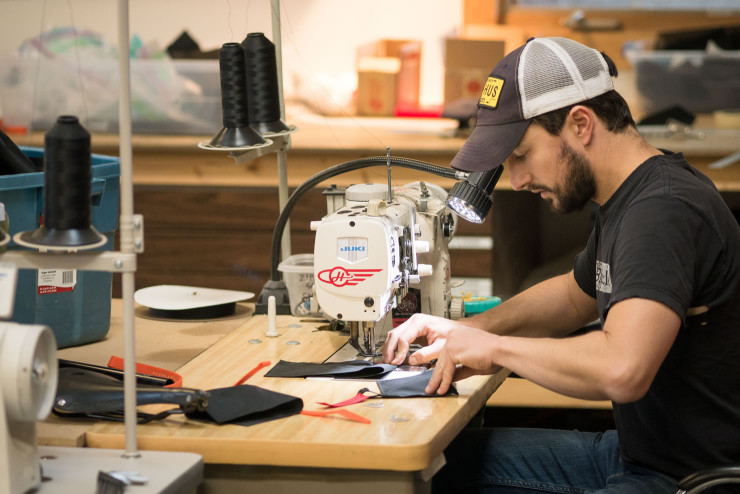
Four years ago, when Scott moved to Calgary – where his wife is a curator at a gallery-museum – the shop was assembled in its current location in their three-car garage. Since then, Porcelain Rocket has grown from a one-man operation to include Tim, a transplant from England, by way of Red Deer, Alberta, and Vancouver, and a part-time seamstress who helps out in peak season.
While visiting Calgary last month to help with prototyping the new Albert seat pack, I sat down with Scott and Tim to ask about the past, present, and future of Porcelain Rocket. Though asking these questions over email often yields more concise and polished responses, Scott and Tim like to keep it real. After all, one of the foundational values behind Scott’s approach to business is that the value of objects is derived entirely from real human efforts, ideas, and places. In a world that often fetishizes material things and awards them some inherent value, this prioritizing of the interpersonal over the bottom-line has yielded an unconventional business model.
So, instead of aiming for eloquence, and because we are human, I recorded a stream of conscience conversation over the din of rattling sewing machines, which I’ve transcribed here, and have edited slightly so that it can reasonably be followed in text.
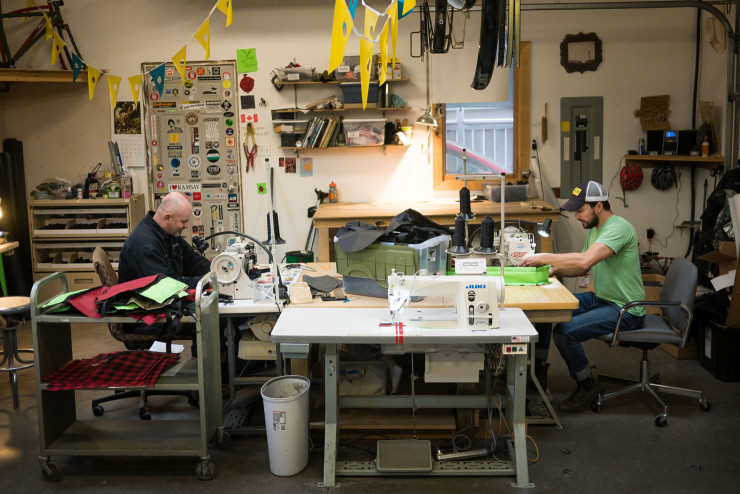
Skyler: How did you come to join Scott here, Tim?
Tim: Uh, he’s my neighbour.
Scott: Tim came here cause, basically, we’d just come to Calgary. And with the move to Calgary I was sort of thinking that it would be nice to have some help once I came here, because I was getting to a place with Porcelain Rocket where it was more than what I could do alone. So, uh, I kinda knew I needed someone and met Tim and got to know him and he was in a place where – like a transition place – looking for something else to do and…
Tim: And two plus two equals four!
Scott: I just figured well, you know, we’ll give it a shot.
Tim: Turned out fine eh. Look at me now. Award-winning seamstress! …in my mind.
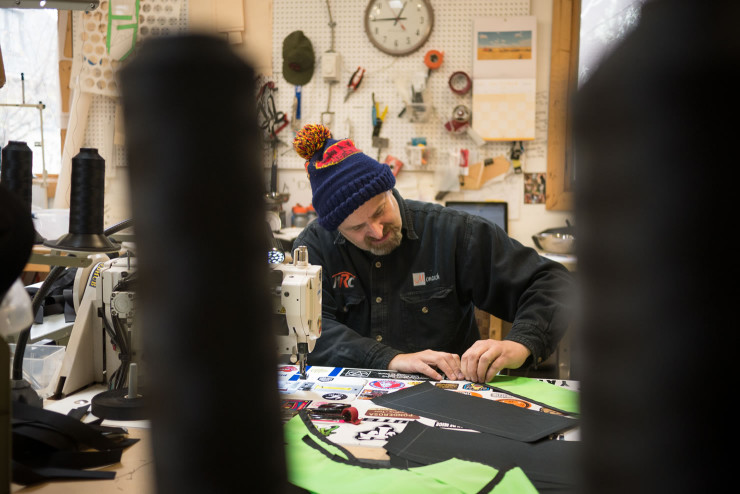
Skyler: So, Tim, how long did that take to learn all this stuff?
Tim: Oh I’d say, a year, year and a half. To get to where I’m at so I don’t have to ask Scott all the time. But it’s an ongoing thing. I’ve just started doing a bit of the top-stitching, like stuff where it really has to be perfect. Critical stuff that you see. Scott does all the custom stuff. I make a lot of sub-assemblies and such. And the fanny packs.
Skyler: The main comments, or the only sort of criticism I’ve seen of you guys is about the lack of availability of your stuff. So can you speak to that?
Scott: Yeah, I mean, often times people think that it has to do with either having enough work, or as much work as we want, or not really caring, or you know kind of being a jerk and driving demand by low supply. But that’s not it at all.
You know, I work 60 hours a week, maybe 70 hours a week to try to meet the demand we have. But also, we’ve tried outsourcing, we’ve done outsourcing, and it’s just not… It just doesn’t feel the same. It’s not the same. You’re not getting the same thing when we outsource so I’d rather make less, make less money, and have 100% confidence in everything that we make and be proud of what we make, rather than just trying to fill demand. So in that way, I guess we do have all the work we want.
Skyler: So you think the frustration might come from people generally perceiving Porcelain Rocket as larger than it is?
Scott: I would assume so. The only thing I can think that that comes from is that we were one of the first and we often get compared to Revelate, or Apidura, or whatever. And those brands have chosen to take the traditional mega-growth mode and maybe outsource it all, whereas we’ve chosen to stay small, work 2.5 employees, and make it all right here. But still be able to keep up in terms of innovation and sort of leading the way in design.
Tim: Good things come to those who wait, as the old cliché goes. So wait you fuckers. (Laughs)
Scott: The problem is we often get compared to Revelate, I guess.
Skyler: Right well I guess you were the ‘big two’ at the start when you were both still small. But you don’t want to go that route? I think everyone has been assuming that growth of any successful business is just natural. Like well, “obviously they want to grow and they will grow”.
Scott: Right, well, we could sell as many Mr Fusions as we could make here if that’s all we did. Or if we had them made somewhere else, we could sell them all as soon as they came in, but…
Tim: But who’d be making it? I’d rather us be making it than anybody else.
Scott: I’m a much better maker than I am a manager.
Tim: Ain’t that the truth.
Scott: I’d much rather spend my days making things – fewer things – and making less money, than just putting things in boxes and shipping them away.
Skyler: You never get sick of making things?
Scott: No. I never do.
Tim: No, he’s always got to be good and busy.
Scott: I’m one of those people that if I’m not doing something, especially with my hands, I’m not happy.
Tim: That’s why the juxtaposition between us is brilliant. Because I’m the opposite. I can easily sit in front of a wall all day and be totally happy.
Scott: (Laughing) Well, in a way it is nice cause the things that I can’t stand Tim excels at and…
Tim: Yeah, cause I don’t mind doing the same old shit over again. I love the repetive jobs…cutting, making sub-assemblies…
Scott: So it frees me up to do the custom stuff or do like, research and development stuff.
Tim: I’m happy to doodle away at what I have to do. If I have my list, I just do it. It’s not that I don’t ever contribute to the design process. I just give more of the layman’s perspective, right, cause I’m from outside the [bike] industry right. I don’t really get what the hell…
Scott: That’s a really good point actually. (To Tim) You sort of represent the average user. I make these assumptions in my head that everyone that kind of thinks like me and knows what I know about the bike world or like how the bag should go on and what it should look like on the bike, whereas Tim’s opinion on how things should look or go onto the bike is worth a lot to me because it is outside my brain. It’s a more objective perspective.
Tim: Right cause a lot of Scott’s life is bike right. And to me, it’s not. I’d rather be fishing than riding a bike.
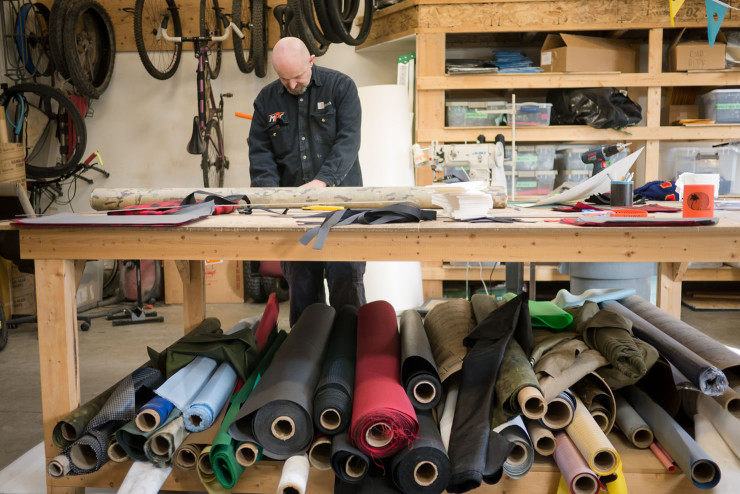
Here, we trailed off down some tangent that is mostly incomprehensible in the recording, and what is clear is that it lost the main thread of the conversation. You’ll have to excuse this rather abrupt jump in the transcript. Here, the conversation turns back to the original question about staying small as a business but relevant…
Scott: In a way – and this is something I’ve come around to only in the last, say, two months – having a bunch of new players in our industry that are making things that are off the shelf, that you can walk into a bike shop and buy is, in a way, doing me a favor because it actually frees me up to deal with the things that I want to invest my time and energy into doing…like the dropper seat pack. If I’m just pecking away at a custom list that’s 180 people long, because it’s just me and Revelate making bikepacking bags, then innovation’s not going to happen.
Skyler: So yeah, that was going to be my next question. I guess you wrote a blog post about this, but I was wondering about the move away from custom gear.
Scott: While I do enjoy doing custom, and it can be stimulating on the creative front but making black frame bag after black frame bag to fit different bikes isn’t that creative. It’s just filling a need, or a demand. I would much rather spend my time doing things that I’m really proud of and that I feel are pushing the boundaries of what our industry looks like.
Skyler: So really the seat packs?
Scott: Yeah. Seat packs are going to be our main focus for 2017 because that’s where we excel. That’s where my passion is right now – developing seat packs that are the better than anything else out there.
Skyler: So by not doing custom, how much do you think production will go up? By not spending half your day answering emails about custom orders…
Scott: Uhhh…300%?
Tim: Take his phone away and then we’ll see.
Skyler: Woah, really? It will triple?
Scott: Yeah, for standard items, like Mr Fusion, easy.
Skyler: So like, from a revenue perspective, even charging a lot for custom doesn’t make much sense, cause you could be making like ten seat packs in the same amount of time.
Scott: Totally. Custom is not a good business model if you want to make money. It’s just not. Especially in textiles. Um…letting someone else tell you how to make something is not a good business model if you want to make money. And it took me seven years to realize that. I mean, when I started out I thought “how hard can it be?” You’d spend your day making shit for people, and they’d pay you for it. Turns out, pretty damn hard. When the wait list is 150 people long, it’s pretty damn hard.
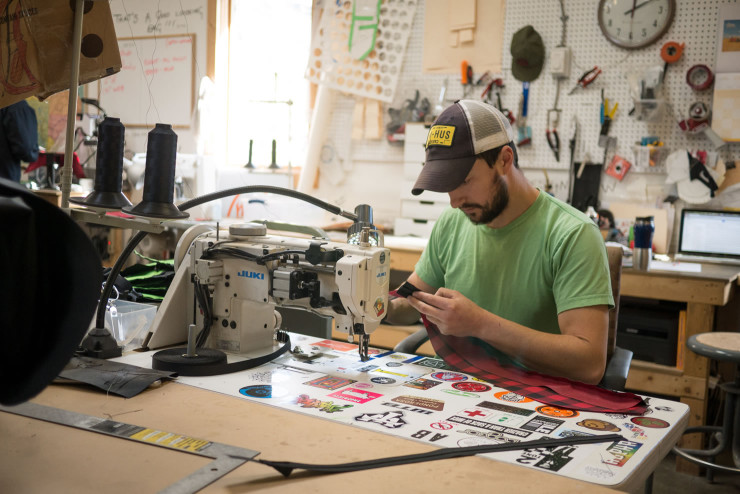
Skyler: Thinking about your inbox gives me anxiety, actually.
Scott: Yeah man. There were days last year when I would get 70 emails a day…so yeah I think not doing custom will probably triple production. I made fifty Mr fusions last week. Alone. Cutting and making, alone. I don’t anticipate keeping that up, ‘cause I was really humping it last week, but if I can build 30 in a week? If I only spent my time making Mr Fusions, we could build 120 a month, that’s insane! We could sell them.
So, taking our product line and instead of trying to be that one-stop shop where you can get a handlebar bag, a top tube bag, a frame bag, and a seat pack AND and you expect it to be your colour, and you expect it to innovative, and the best…You know, that’s crazy! Especially for two and a half dudes. So I think by not doing custom, and really reducing the products that we offer, we’ll make better stuff. It’s kind of like going to a restaurant. Naomi (his wife) always says this: She’d rather go to a restaurant with four things on the menu than one of those pubs that has forty choices. That’s what we’re going to be, and for now we’re going to stand alone in that.
This year we’re going to push the seat pack thing hard. Seventy-five percent of the emails I get are about Mr Fusion.
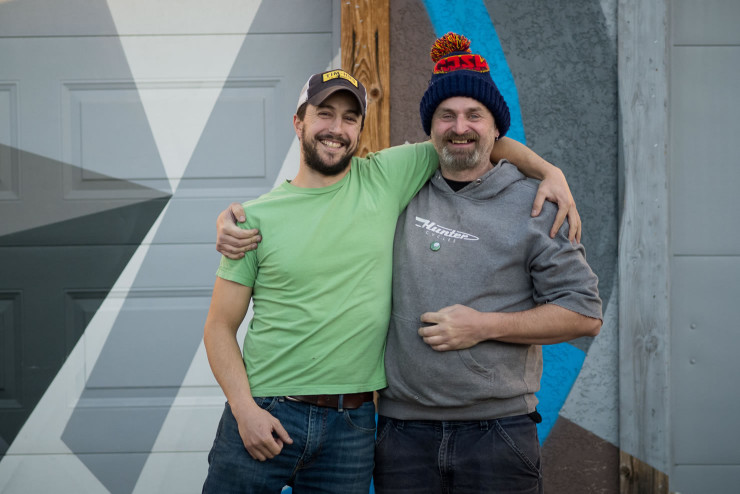
Related Links
- Porcelain Rocket Albert: The World’s First Dropper Post Seat Pack
- Porcelain Rocket Mr Fusion: The 5,000 Mile Review
- Porcelain Rocket Orbiter Review: The Zipperless Frame Pack
Please keep the conversation civil, constructive, and inclusive, or your comment will be removed.
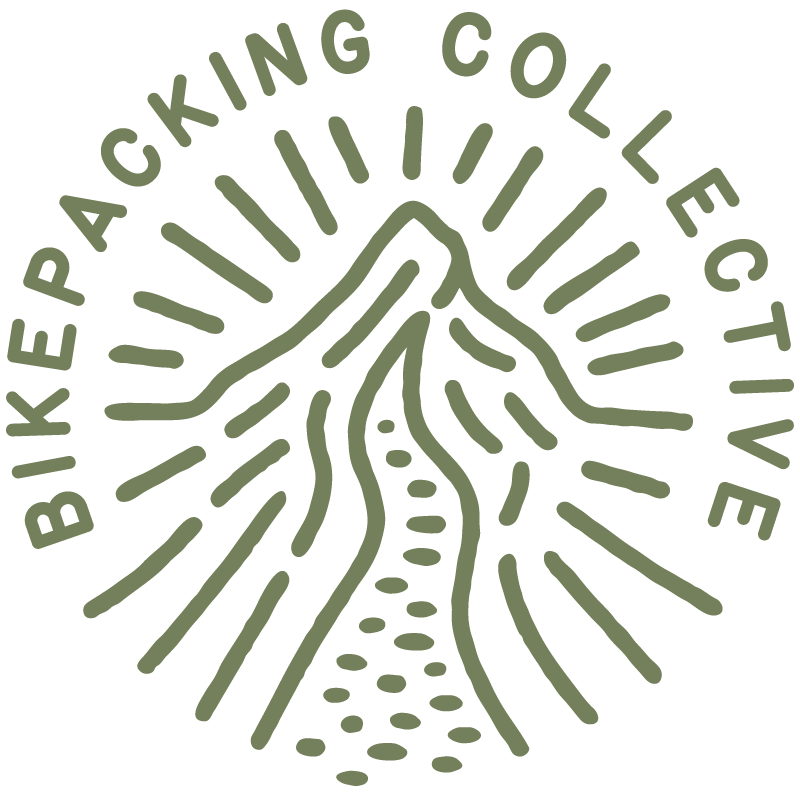
We're independent
and member-supported.
Join the Bikepacking Collective to make our work possible:







